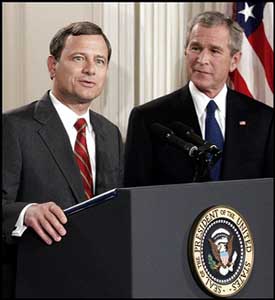-
- Oregon House leaders gut civil unions bill
- Conservative Kansas legislator pushes for review of adoption criteria
- Mass. tells hospitals to cross out ‘father’ on birth certificates
- Bush chooses appeal judge John Roberts, Jr. for Supreme Court
- After year of domestic partnership, push grows in New Jersey for marriage
- Exodus meets in North Carolina
- National News Briefs
- World News Briefs
-
- Grand Marshal: Ben Dillingham
- Grand Marshal: Michael ‘Big Mike’ Phillips
- Grand Marshal: Alice A. Huffman
- Grand Marshal: Joseph ‘Joey’ Ramelli and Megan Donovan
- Champion of Pride: Dr. William ‘Bill’ Beck
- Champion of Pride: Jennifer LeSar
- Friend of the Year: Marc Chery
- Community Service Award: Todd Gloria
- Community Service Award: Linda Childers
- Community Service Award: Cathy Hemphill
- Stonewall Service Award: KPBS-TV
national
Bush chooses appeal judge John Roberts, Jr. for Supreme Court
Roberts’ conservative ideology pleases conservatives, worries liberals
Published Thursday, 28-Jul-2005 in issue 918
WASHINGTON (AP) – President George W. Bush named federal appeals judge John G. Roberts, Jr. to fill the first Supreme Court vacancy in a decade, delighting Republicans and unsettling Democrats by picking a young jurist of impeccably conservative credentials.
If confirmed by the Republican-controlled Senate, the 50-year-old Roberts would succeed retiring Justice Sandra Day O’Connor, long a swing vote on a court divided over abortion, affirmative action, states’ rights and more.
Bush offered Roberts the job July 19 in a lunchtime telephone call, then invited him to the White House for a nationally televised, prime-time announcement. The president said his choice will “strictly apply the Constitution in laws, not legislate from the bench.”
In brief remarks, Roberts said he has argued 39 cases before the Supreme Court in a career as a private attorney and government lawyer. “I always got a lump in my throat whenever I walked up those marble steps to argue a case before the court, and I don’t think it was just from the nerves,” he said.
“I look forward to the next step in the process before the United States Senate,” he added.
That was a reference to confirmation hearings before the Senate Judiciary Committee, expected to begin in late August or early September. That would allow plenty of time for the Senate to meet Bush’s timetable of a vote before the high court begins its new term on Oct. 3.
In making his first nomination to the court, Bush had an opportunity to expand his conservative agenda and extend it past his presidency. Justices serve until they retire or die. The court is the third branch of the U.S. government and decides on many contentious social issues that divide Americans.
Bush administration officials arranged for Roberts to pay his first courtesy calls on leading senators last week after breakfast with Bush in the White House residence. Republican reaction to the appointment was strongly supportive, while Democrats responded in measured terms.
“I’m just a little surprised that he’s already subject to criticism. But this is America,” said Republican Sen. Arlen Specter of Pennsylvania, chair of the Judiciary Committee.
Sen. Edward M. Kennedy of Massachusetts, reflecting an emerging Democratic strategy, said he would use the hearings to probe whether Roberts can “separate his personal ideology from the rule of law.”
Advocacy groups on the left and the right have made plans for multimillion-dollar confirmation campaigns featuring television advertising and grass-roots organizing designed to sway swing vote senators. The ferocity of the battle is undetermined, however.
Abortion – arguably the most politically charged issue to confront Congress and the courts – swiftly emerged as a point of contention.
The abortion rights group NARAL Pro-Choice America announced its opposition to Roberts when word of his appointment leaked before Bush’s formal announcement.
In a written statement, the organization cited a brief Roberts had filed with the Supreme Court while serving as deputy solicitor general in the first Bush administration. In the brief, Roberts said “Roe was wrongly decided and should be overruled,” referring to Roe v. Wade, the landmark 1973 ruling that established a woman’s right to abortion.
In his defense, Roberts told senators during 2003 confirmation hearings to his current post that he would be guided by legal precedent. “Roe v. Wade is the settled law of the land. … There is nothing in my personal views that would prevent me from fully and faithfully applying that precedent.”
The National Right to Life Committee, which opposes abortion, countered with a statement of its own. “Liberal pressure groups will insist that Senate Democrats filibuster against Judge Roberts, unless he pledges in advance to vote against allowing elected legislators to place meaningful limits on abortion,” said the group’s legislative director, Douglas Johnson. “Millions of Americans will be watching to see if the Democratic senators bow to these demands.”
Democratic response was measured, but initially at least, offered no hint of a filibuster.
“The president has chosen someone with suitable legal credentials, but that is not the end of our inquiry,” said Senate Democratic leader Harry Reid of Nevada. Referring to planned hearings in the Senate Judiciary Committee, Reid said, “I will not prejudge this nomination. I look forward to learning more about Judge Roberts.”
Bush did not ask Roberts any questions about abortion, same-sex marriage or other specific issues that might come before the Supreme Court, the official said.
|
|
Copyright © 2003-2025 Uptown Publications


